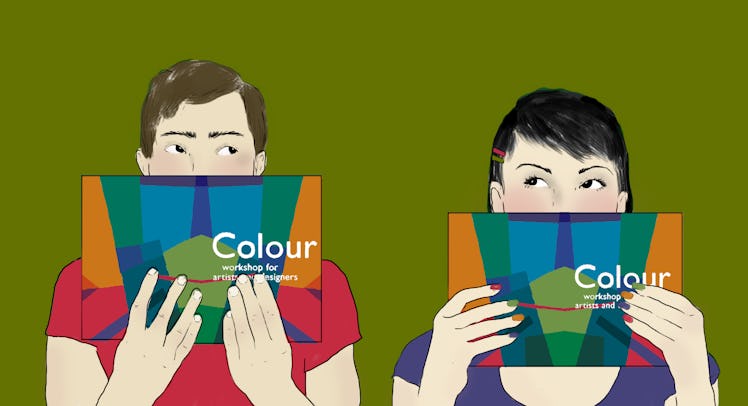Read the Same Book As Your Wife
Reading the same book simultaneously with your wife provides a huge opportunity for rich conversation and serious bonding.

I plopped my tablet down on the bed, rolled onto my left side and gave my wife a wide-eyed look. She glanced up from her Kindle and with an expectant expression.
“The diary is bullshit,” I pronounced. “It has to be. It just doesn’t track.”
“Huh. You think?” she asked.
“Well, yeah, look at what Nick has been saying about Amy and then you read her own description? It’s not right,” I said.
“That’s an interesting theory,” she said. “But I’m really curious about this cell phone he keeps not answering. I’m still not sure he didn’t do it.”
“Me neither,” I said picking up my tablet again.
For the next two hours, we were silent. Then my wife plopped down her Kindle and said, “He’s been cheating on her.”
“Yep.”
My wife and I were reading Gone Girl, Gillian Flynn’s thriller about murder and marital anxiety. It was the second book we’d tackled simultaneously and it was proving to be an incredible bonding experience. For a week we’d been curled up beside each other in bed, or on the couch, each of us with a digital copy we’d scored from a public library app. We kept each other abreast of our progress by calling out what percentage of the book we’d read, allowing one another to catch up when we’d get too far ahead: “Where are you!? I’m at 30 percent!”
That book allowed us to discuss our fears and anxieties. It allowed us to talk about human nature and wonder about what it means to keep our kids and each other safe.
Occasionally we’d stop reading to call out passages we enjoyed. At night, before we turned the lights out, we would chat about the plot and toss theories back and forth. The taut drama of the dysfunctional, married couple, spooling across the pages became the backbone of pointed conversations about our own marriage.
“I mean, you wouldn’t kill me just because you were having an affair, right?” my wife would query.
“Well, you know, there aren’t many options considering Catholics don’t believe in divorce,” I’d tease, perhaps inadvisably.
The experience was remarkably similar to the last book we’d read together on a short anniversary vacation: Michelle McNamara’s I’ll Be Gone in the Dark. We’d both had hardcovers that time and whiled away hours beside the pool and in our hotel bed pouring over the true crime tale.
That book allowed us to discuss our fears and anxieties. It allowed us to talk about human nature and wonder about what it means to keep our kids and each other safe. It allowed us to feel a little like a ghoulish clique in the bright Las Vegas sun.
Reading books with my wife is nothing like binge-watching Netflix shows with her. When we’re looking at a screen we rarely talk about what we’re watching. We don’t offer theories or launch into conversations related to our own life.
I think it’s because the pictures on the shows are painted for us. We are literally seeing the same thing. What is there to question? Besides, the answers are in the next episodes. And the next episodes are always there until we are too tired to keep watching, and at that point, conversation isn’t what’s on our mind.
It allows us to be still beside one another, at once sharing an experience while engaging in a simultaneously independent and personal experience. There’s something endearing about that
Books are fundamentally different. The story arcs are more complicated and broad. The pacing is slower and more deliberate. And every reader builds a distinct vision of what they’re reading, completely unique to their own imagination. These qualities make books ripe for conversation. There’s more space to speculate and ponder. There’s no timer counting down, no autoplay of the next episode to stop the conversation before it gets really good.
But learning about my wife isn’t the only benefit to reading the same book with her. Practically, reading is a quiet task. It keeps the house quiet as our children sleep. It allows us to be still beside one another, at once sharing an experience while engaging in a simultaneously independent and personal experience. There’s something endearing about that.
More than that, when our children see us read, it reinforces the idea that reading is a valuable pastime in our family. We want our children to be readers, so why wouldn’t we be readers ourselves.
I get that the idea of reading the same book at the same time might feel a bit precious, like a strange book club of two. But it doesn’t feel that way. And besides, there is a reason book clubs are popular with women. It’s not just the wine. It’s the conversation. And conversation can be lacking in marriages.
I know my wife feels that way too. After we’d finished Gone Girl and spent an evening discussing the themes and the stark ending, I’d assumed we might read the next book separately. I’d downloaded Good Omens by Neil Gaiman and Terry Pratchett, a screwball end-of-the-world tale and wasn’t sure she’d be into the bizarre British humor. But I couldn’t stop reading her passages and soon enough she’d downloaded it herself. I’m waiting for her to catch up to me and I can’t wait to talk to her about Armageddon.